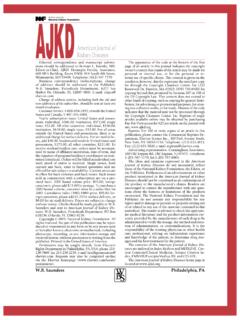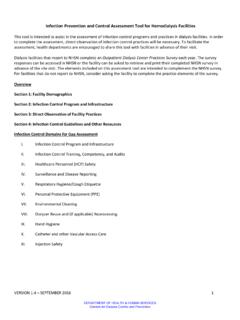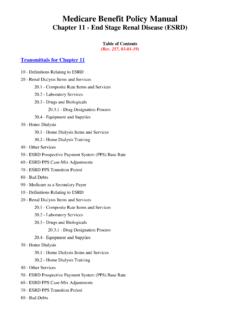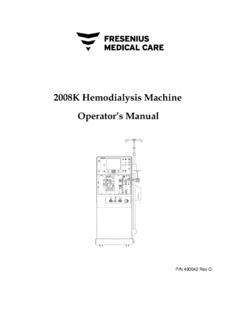Transcription of What You Need to Know - National Kidney Foundation
1 hemodialysis : what You Need to Kidney Foundation 's Kidney Disease Outcomes Quality InitiativeDid you know that the National Kidney Foundation 's Kidney Disease Outcomes Quality Initiative (NKF-KDOQI ) offers guidelines and commentaries that help your doctor and healthcare team make important decisions about your medical treatment? The information in this booklet is based on those recommended of Kidney DiseaseThere are 5 stages of Kidney disease. They are shown in the table below. Your doctor determines your stage of Kidney disease based on the presence of Kidney damage and your glomerular filtration rate (GFR), which is a measure of your level of Kidney function. Your treatment is based on your stage of Kidney disease. Speak to your doctor if you have any questions about your stage of Kidney disease or your treatment.
2 *Your GFR number tells your doctor how much Kidney function you have. As chronic Kidney disease progresses, your GFR number OF Kidney DISEASES tageDescriptionGlomerular Filtration Rate (GFR)*1 Kidney damage ( , protein in the urine) with normal GFR90 or above2 Kidney damage with mild decrease in GFR60 to 893 Moderate decrease in GFR30 to 594 Severe reduction in GFR15 to 295 Kidney failureLess than OF CONTENTSWhen will I need to start treatment for Kidney failure? ..5 what does dialysis do to keep me healthy? ..6 How does hemodialysis work? ..6 How does the dialyzer clean my blood? ..8 Where is hemodialysis done? ..9 How long will each hemodialysis treatment last? ..9 How do I know if I am getting the right amount of dialysis? ..10 Can hemodialysis be done at home? 12 Home hemodialysis versus a center:Pros ..15 Cons.
3 16 Can dialysis cure my Kidney disease? 17I have heard I might have to reuse my dialyzer for each treatment. Is this safe? ..19 Will I need to follow a special diet? .19 what insurance coverage is available for dialysis? ..21 Will dialysis change my lifestyle? ..22 Can people on dialysis travel? ..22 Can people on dialysis continue to work? ..23 Understanding your lab values ..24My dialysis care team ..26 Where can I get more information? .26 National Kidney FOUNDATION4 Healthy kidneys clean your blood and remove extra fluid in the form of urine. They also make hormones your body needs for some important functions. When Kidney failure occurs, treatment is needed to replace some of the important jobs your kidneys do. The treatments for Kidney failure are hemodialysis , peritoneal dialysis, and Kidney transplant. Learn all you can and speak to your doctor about which is the best choice for booklet is about hemodialysis .
4 It is written for people who are already receiving hemodialysis , and for those who soon may need to start treatment for Kidney failure. Information is based on recommendations from the National Kidney Foundation s Kidney Disease Outcomes Quality Initiative (NKF-KDOQI ) Clinical Practice will I need to start treatment for Kidney failure?Treatment is needed when someone has stage 5 chronic Kidney disease (CKD), or Kidney failure. Your doctor can tell your stage of Kidney disease by checking your glomerular filtration rate (GFR). Your GFR can be estimated from the results of a blood test for creatinine, a waste product from muscle your GFR falls below 15, you have Kidney failure (CKD stage 5), and you will need to have a Kidney transplant or dialysis treatment to replace the function of your your GFR is less than 30, your doctor should talk to you about the different treatments for Kidney failure.
5 Ask about information classes in your area where you can learn more about treatment options for Kidney failure. Learn all you can to make the best treatment choices for yourself and your Kidney FOUNDATION6 what does dialysis do to keep me healthy?Both hemodialysis and peritoneal dialysis do the following: Remove waste and extra fluid to prevent them from building up in your blood Help to regulate blood pressureHow does hemodialysis work?A hemodialysis machine has a special filter called a dialyzer (also called an artificial Kidney ) to clean your blood. To get your blood to the dialyzer, a surgeon will make an access, or entrance, into your blood vessels. This is done with minor surgery, usually to your main types of access can be made a fistula or a fistula is the first choice for an access. It is made by joining an artery to a nearby vein under your skin to make a bigger blood vessel.
6 This type of access is preferred because it has fewer problems and lasts longer. You should be evaluated by a special doctor called a vascular surgeon at least six months before you will need to start dialysis. A fistula should be placed early (several months before dialysis) so it has plenty of time to heal and be ready by the time you need your blood vessels are not suitable for a fistula, a graft may be used. This involves joining an artery and nearby vein with a small, soft tube made of synthetic material, placed under your the fistula or graft has healed for at least several months, it can be used for dialysis. Two needles will be placed every time you go for treatment. The needles are connected to plastic tubes. One tube carries your blood to the dialyzer where it is cleaned and the other tube returns the cleaned blood to third type of access, called a catheter, is a soft tube inserted into a large vein in your neck or chest.
7 This type of access is generally used when you need dialysis for only a short period of time. Catheters may be used as a permanent access when a fistula or a graft cannot be placed. Catheters can be connected directly to the dialysis tubes and needles are not used. Catheters have more health complications than other types of Kidney FOUNDATION8 How does the dialyzer clean my blood?Inside the dialyzer, or filter, there are two sides one for your blood and the other for a fluid called dialysate. A thin membrane separates these two sides. Blood cells, protein and other important things remain in your blood because they are too big to pass through the Parts of the hemodialysis SystemFistula or graft accessSmaller waste products, such as urea and creatinine, and extra fluid, move from your blood through the mem-brane, and are removed.
8 The composition of the dialysate, or cleansing fluid, is made for your special needs according to your doctor s is hemodialysis done? hemodialysis can be done at a hospital, at a dialysis center that is not part of a hospital, or at home. You and your healthcare provider will decide which place is best, based on your medical condition and your long will each hemodialysis treatment last? hemodialysis treatments are usually done three times a week. Each treatment lasts about four hours, but you may need more time to ensure that enough wastes and fluid are removed. The amount of dialysis you need depends on: How much your own kidneys are working How much fluid weight you gain between treatments How much waste you have in your blood The type of artificial Kidney used by your dialysis centerYour doctor will write a dialysis prescription for your individual treatment needs .
9 Studies have shown that getting the right amount of dialysis improves your overall health, National Kidney FOUNDATION10makes you feel better, keeps you out of the hospital, and may enable you to live do I know if I am getting the right amount of dialysis?Your healthcare provider will develop a special dialysis prescription for you. This will help make sure that you get the right amount of treatment. In addition, your dialysis care team will monitor your treatment with monthly lab tests to measure the amount of dialysis you receive (your dose of dialysis). The most accurate way to measure this is called urea kinetic modeling. The number that tells how well your blood is being cleaned by dialysis is your Kt/V (sounds like kay tee over vee ). The goal for your Kt/V number may vary depending on how often you have dialysis and on how much remaining Kidney function you have.
10 For many dialysis patients who have three treatments weekly, Kt/V should be at least for each methods are sometimes used to measure delivered dose of dialysis. For example, some dialysis centers may use the urea reduction ratio (URR). If this ratio is used to measure your dose of dialysis, your URR should be at least 65 percent for each your dose of your dialysis care team what test they are using to determine your dose of what your number is. If your number is not as good as it should be, ask how it can be your dialysis care team to make sure: Your access is working well Your dialyzer is working well Your blood flow and the flow rate of the dialysate fluid (cleansing fluid) are not too slow during dialysis Your blood samples are taken correctlyYou can help to ensure that you receive enough dialysis by: Keeping all your appointments Completing your full treatment Taking care of your accessNATIONAL Kidney FOUNDATION12 Can hemodialysis be done at home?

















